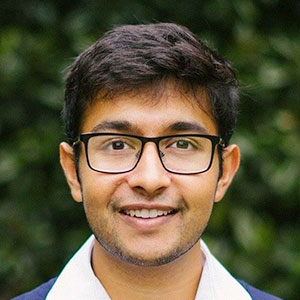Keep It Simple
I was flawed in my belief that the level of complexity with which I presented myself would earn me respect as a scholar.“Am I a fraud?” As our lecturer talked, my attention diverted briefly as questions pervaded my thoughts. “Who am I deceiving? Myself? My peers? Society as a whole?”
Before launching into the core of his seminar on “How To Talk About Science With Impact,” Dr. Jory Weintraub had briefly introduced the concept of the imposter syndrome – the feeling that arises when one doesn’t believe they are qualified to be in a certain position when in reality they deserve it. I’m not quite sure why such a quick tangent had completely seized my thinking and catapulted me into a moment of self-reflection so suddenly. Maybe it’s because this new term labeled a feeling that I’ve experienced as an aspiring scientist and physician in the earliest chapter of a long journey.

If you ask my parents, they would tell you that I always had an inclination towards science and math growing up. Simple activities like modeling with play-doh to demonstrate geology or making ice cream to visualize chemical reactions taught me integral concepts that still serve me as a college undergraduate. As I continued my schooling, the complexity of the curriculum picked up and I eventually graduated from 5-minute presentations to 50-minute lectures overrun by scientific jargon. Before I knew it, I had started to believe that the complicated, technical language was an innate aspect of the scientific field. In my imagination, a scientist would be an individual who along with having the capacity to think logically also wielded fancy and complicated vocabulary to back the logic.
Perhaps this is the reason why whenever I talk science I am compelled to spew jargon. I sometimes wonder if I have started to emulate my perceived image of a scientist. Not only do I occasionally find my words saturated with technical lingo but my written work as well. As I go back and read early drafts of some of my research papers from various classes I can pick out excerpts of text that are littered with unnecessary terminology.
When Dr. Weintraub discussed science communication and the imposter syndrome, I couldn’t help but consider if I was “suffering” from the condition. As a scientist at the dawn of their journey, maybe I have the inclination to default to scholarly nomenclature because I want to assert myself as an authority? It’s as if I am not personally convinced that I am qualified to be a scientist and I have to resort to being a stereotype to validate my status as an intellectual not only to myself but also to my peers and the greater community. I may be compensating for my relative inexperience in the academia by filling my diction with “scientific” vocabulary. I’m hiding behind the complexity of my words to avoid exposing gaps in my knowledge that only exist because I’m at the very beginning of my career. Maybe I don’t deserve to be doing research? Maybe I’m only posing as a scientist?
This could be the reason that my mind launched into a stream of thought when I was introduced to the concept of the imposter syndrome?
After having listened to the entirety of Dr. Weintraub’s lecture, other high-profile scientists, and taken the time to self-reflect during the past few days, I realized that effective science communication isn’t what I had originally perceived. Of the many points that Dr. Weintraub brought to attention, one of the most essential was the idea that one should keep their audience in mind when talking. In this sense, my current tendencies of communication aren’t completely inappropriate. I could hold my ground in a room of other scientists, but if I was to explain my research to family, friends, or non-scientists, I would have to alter my method of delivery. As I continue my pathway to becoming a physician-scientist, I am becoming more cognizant of the fact that patients, politicians, and the public do not have time to get caught up in the details. It is not the vernacular or terminology that matters, but the message that is being delivered.
I was flawed in my belief that the level of complexity in which I presented myself would earn me respect as a scholar. I’ve learned that the manner in which I communicate as well as the message I am communicating are interconnected. I can have the greatest impact and garner status only if I transmit my thoughts with clarity and purpose. I’m starting to appreciate the fact that it doesn’t always matter how much you know, but rather how well you can communicate what you do know. Ultimately, when it comes to talking about science, I don’t feel like as much of a fraud anymore. But as I continue to dive deeper into the field I need to be able to adapt and remain aware of how to convey my knowledge with impact faithfully.
Nimish Garg, Huang Fellow ’18
 Nimish is learning about epigenetics and ethical research as part of the Genomics and Genetics focus cluster.
Nimish is learning about epigenetics and ethical research as part of the Genomics and Genetics focus cluster.

